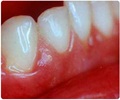Gum disease treatment reduces symptoms of prostate inflammation, called prostatitis, a disease that inflames the gland that produces semen.

"This study shows that if we treat the gum disease, it can improve the symptoms of prostatitis and the quality of life for those who have the disease," said corresponding author Nabil Bissada from Case Western Reserve University School of Dental Medicine.
Bissada explained that gum disease not only affects the mouth, but is a system-wide condition that can cause inflammation in various parts of the body.
The researchers studied 27 men, 21 years old and older. Each had had a needle biopsy within the past year that confirmed inflammation of the prostate gland, and a blood test that showed elevated prostate specific antigen (PSA) levels--possible signs of inflammation and cancer.
Researchers found 21 of the 27 participants had no or mild inflammation, but 15 had biopsy-confirmed malignancies. Two had both inflammation and a malignancy.
All the men had moderate to severe gum disease, for which they received treatment. They were tested again for periodontal disease four to eight weeks later and showed significant improvement.
Advertisement
Those with the highest levels of inflammation benefited the most from the periodontal treatment. Six participants showed no changes.
Advertisement
The findings appeared in the journal Dentistry.
Source-IANS















